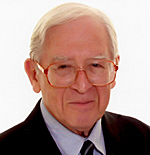Victor T. Le Vine, PhD, professor emeritus of political science in Arts & Sciences at Washington University and internationally known expert on terrorism, hostage situations, guerrilla warfare and political problems of the Middle East and Africa, died May 7, 2010, at his home in University City, Mo. He was 81.

A member of the Arts & Sciences faculty at WUSTL since 1961, Le Vine died from complications of open heart surgery. He was cremated following private family services.
The university is planning a memorial service beginning at noon Thursday, June 17, in the Whitaker Hall Auditorium; a reception will follow in the Whitaker Hall Atrium. For more information and reservations, call the political science department at (314) 935-5852.
Le Vine was a frequent news commentator on issues related to U.S. foreign policy in the Middle East as well as the U.S. handling of domestic terrorism threats. His opinion pieces appeared often in national news outlets.
As part of an international conference on post-conflict constitutional reconstruction, Le Vine spent two years examining constitution-making in countries torn by war, revolution, rebellion and internal collapse. He predicted in 2004 that Iraqi nation-building would be both “painful and agonizingly difficult.”
A consultant for the U.S. Peace Corps, State Department and the Department of Defense, he was heavily involved in projects related to constitutional issues and political unrest in emerging African nations. In the 1990s, he helped write a constitution for the African nation of Eritrea.
He is the author or co-author of seven scholarly books and monographs, including The Arab-African Connection: Political and Economic Realities; Political Corruption: A Handbook; and Politics in Francophone Africa: The States of West and Equatorial Africa.
Born in Berlin, Germany, on Dec. 6, 1928, as the only son of a Jewish couple from Russia, he immigrated to the United States in 1938.
He earned a bachelor’s degree from the University of California, Los Angeles, in 1950 and attended law school there before serving two years as a U.S. Army intelligence officer during the Korean War.
Fluent in Russian, German, French and English, he declined jobs with U.S. intelligence agencies to pursue teaching.
“He was always an academic at heart,” Nathalie Le Vine, his wife of nearly 52 years, said in a recent interview with the St. Louis Beacon. “He loved teaching.”
Le Vine taught high school in Los Angeles before earning a master’s degree and doctorate in political science, in 1958 and 1961, respectively, from the University of California, Los Angeles, during which he studied in Cameroon as a Fulbright Scholar.
Le Vine held visiting appointments at the University of Texas at Austin and at universities in Cameroon, Ghana and Jerusalem. He lectured in Europe, the Middle East, Saudi Arabia, China and Africa, where he served often as an international elections monitor.
For more than 30 years, he volunteered as a pro-bono immigration bar witness for refugees seeking asylum in the United States. For most of the 1990s, he was president of the Centre for International Understanding, a private organization promoting nonviolent conflict resolution.
Le Vine retired from the full-time faculty at WUSTL in 2003, but continued to teach at least one course per year as an emeritus professor. Despite faltering health, he planned to teach a popular course on terrorism in fall 2010.
He is remembered as an enthusiastic mentor of students and as a great colleague to faculty across campus.
“He was always upbeat, friendly and ready with a story or a joke,” said fellow political science professor William R. Lowry, PhD. “He really was a very decent man.”
In addition to his wife, Nathalie, former artistic director of the Ballet Conservatory of St. Louis, Le Vine is survived by a son and a daughter, four grandchildren and two great grandchildren. Le Vine’s son, Ted, earned a bachelor’s degree from the university’s Olin Business School in 1986.